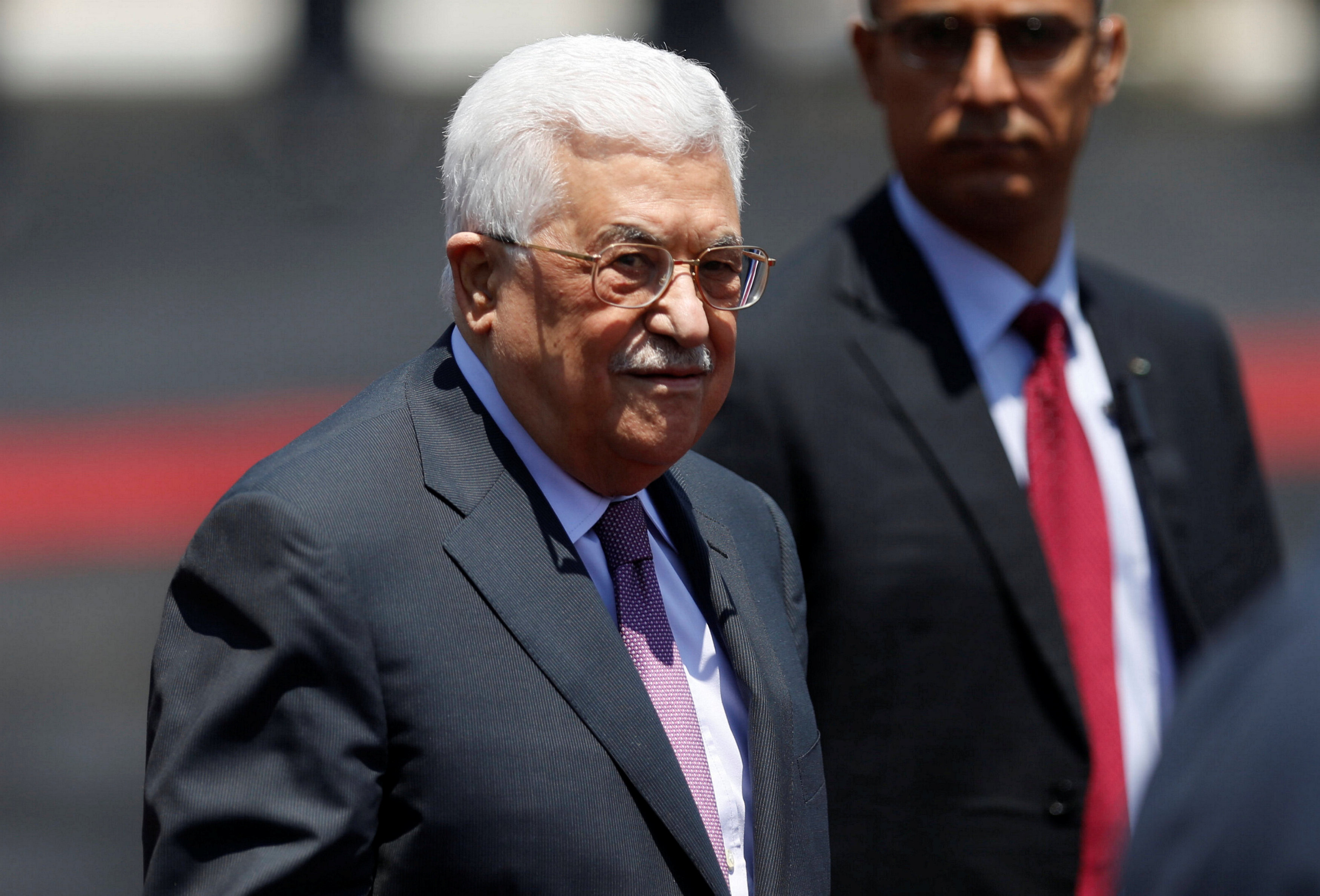 Palestinian President Mahmoud Abbas stands during a reception ceremony for Jordan’s King Abdullah II in the West Bank city of Ramallah, August 7, 2017. Picture taken August 7, 2017. REUTERS/Mohamad Torokman
Palestinian President Mahmoud Abbas stands during a reception ceremony for Jordan’s King Abdullah II in the West Bank city of Ramallah, August 7, 2017. Picture taken August 7, 2017. REUTERS/Mohamad Torokman Amir Tibon is an Israeli journalist who covers Washington, D.C. for Haaretz newspaper. Prior to Haaretz, Tibon was the diplomatic correspondent for Walla News, a leading Israeli news website. His writing on Israel, the peace process and the Middle East has appeared in Foreign Affairs, Politico Magazine, The New Yorker, The Atlantic, Tablet Magazine, The New Republic, The Huffington Post, The American Interest, and The Jerusalem Report.
Grant Rumley is a research fellow at the Foundation for Defense of Democracies, where he focuses on Palestinian politics. Rumley has published in leading media outlets, including Foreign Affairs and Foreign Policy, and contributed commentary to The New York Times, Reuters, and Newsweek. Prior to joining FDD, Rumley was a visiting fellow at Mitvim, The Israeli Institute for Regional Foreign Policies. While in Jerusalem, Grant also founded and edited The Jerusalem Review of Near East Affairs. Previously, Grant served as a consultant in Washington on issues related to counter-terrorism, the Middle East, and war-gaming strategies.
The following exchange will focus on Tibon and Rumley’s new book The Last Palestinian: The Rise and Reign of Mahmoud Abbas (Prometheus Books, 2017). You can find parts one and two here and here.
***
Dear Grant and Amir,
I’d like to dedicate our third round to the complicated hate triangle between Abbas, Hamas and Netanyahu. In your book, there is a description of Abbas’ reaction to the Shalit deal, which the previous Netanyahu-led government made with Hamas:
In one conversation with a senior American official, Abbas complained that “Hamas kidnapped one Israeli soldier and Netanyahu gave them a thousand prisoners for his release. My security forces have returned to Israel more than a hundred Israelis who wandered into our territories, and we got zero appreciation for it.” Indeed, Abbas’s security forces had a policy of escorting Israelis who entered Palestinian cities and towns by mistake into the safe arms of the Israeli military. “If I behaved like Hamas, I could have a hundred Shalit deals by now—there would be no more Palestinians in Israeli prisons. But I choose to do the humane thing and get nothing in return,” Abbas lamented.
My third-round question: looking ahead to the day after Abbas, what would you like, say, an Israeli decision maker reading your book to learn about Israel’s role in the fragile Hamas-Fatah relationship? What mistakes has Israel made, does Israel have a say on the matter and should Israel pursue any specific strategy when it comes to the inevitable succession struggle?
Thank you once again for participating in this exchange.
Shmuel
***
Dear Shmuel,
This anecdote represents a recurring frustration that Abbas has expressed over the years in the ears of Israeli and American officials who have worked with him – that Israel, in his eyes, responds “better” (from a Palestinian point of view) to violence than to negotiations. The Shalit affair is one example he has repeatedly used in this context. The 2005 Gaza disengagement is another, and we discuss it at length in the book. Abbas and people close to him felt that instead of giving the PA a larger role in the withdrawal from Gaza, and thus empowering Abbas in the eye of the Palestinian street, Ariel Sharon insisted to go at it alone and by doing that strengthened Hamas, which told the Palestinian public that Israel withdrew under fire, and that guns and suicide bombers were more efficient in extracting concessions from Israel than negotiations.
Abbas, of course, is also painfully aware of the price the Palestinians have paid for turning to violence. That’s why despite his talk about Israel’s “encouragement” of violence, he has never actually adopted Hamas’ strategy – only lamented about it. But one important conclusion that we hope policy-makers will take from our book, is the importance of creating incentives and benefits for a leader who opposes violence and is committed to negotiations. Abbas deserves a lot of criticism – which can easily be found in our book – but even his harshest critics should give him credit when it is due for opposing violence and supporting negotiations over the years. Unfortunately, that has not happened often enough during his long career as a diplomat and a political leader.
The succession struggle that will come after Abbas is an internal Palestinian affair, in our view. Israel could perhaps affect it by, as we have suggested above, empowering moderate leaders and showing more flexibility towards those who support negotiations and compromise than towards those who support violence and strive for conflict. But they should also beware not to look too eager to support any specific candidate or faction, since that could ultimately empower the ‘other side.’ Can the damages of the past be repaired, in a way that would convince a majority of Palestinians that Abbas’ approach is more beneficial than Hamas’? We hope so, but cannot say for sure.























 More news and opinions than at a Shabbat dinner, right in your inbox.
More news and opinions than at a Shabbat dinner, right in your inbox.